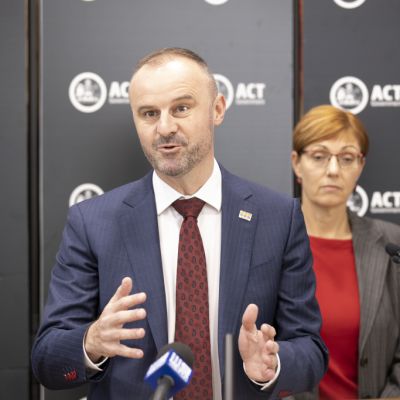How residential tenants will benefit from the ACT government’s $214 million stimulus package

ACT chief minister Andrew Barr announced on Thursday the second phase of the ACT government’s economic “survival” plan worth $214 million, part of which will keep residential tenants afloat amid the coronavirus outbreak.
The new package comes after the state government unveiled a $137 million package last month, bringing the combined ACT government support to $351 million in a six-month period.
According to Mr Barr, the second tranche was developed to “provide relief to those who need it most”. He said there would be three categories in which people would fall into.
The first category were those who have had minor or no impacts from the coronavirus pandemic that had caused an economic fallout and forced many people out of work; the second are those who were significantly impacted with at least a 30 per cent household income loss; and the third were those who had no source of income because of COVID-19.
While the first phase of the package did not mention any measures for tenants, under the new tranche the ACT government will hand land tax and residential rate rebates to landlords who reduce rents for their tenants – who are experiencing rental stress – by at least 25 per cent.
“The government will provide a 50-50 matching arrangement with landlords,” Mr Barr said.
“We will provide direct tax relief to landlords, to the equivalent of around $100 per week [for the next six months].”
According to the government, the cost reduction is capped at $1300 per quarter which could result in rental relief of up to $200 a week for tenants.

“What we’ll incentivise to landlords is the fact that tenants can’t be evicted … under this model and that landlords won’t get any tax benefits unless they come to the table,” Mr Barr said.
“Banks have provided relief from mortgage payments for a period as well, so you’ll have support from landlords, banks and governments but the landlords are going to have to wear some financial pain themselves as well.
“No one in this multi-party transaction is going to escape paying.”
The government is also delaying all general rates notices by four weeks to enable people eligible for Commonwealth assistance to receive it.
For households who are experiencing “significant financial hardship” in the coming months, they will be able to apply for a 12-month deferral on general household rates bills with no interest applied to the deferred amount.
“If anyone is experiencing financial difficulty and needs assistance, they will be given case-by-case support,” Mr Barr said.
REIACT chief executive officer Michelle Tynan welcomed the new measures but noted that there were more questions on how it will work.
“We need to see more how this will play out in line with the reduction that the tenant will pay and how that will work out from a landlord’s perspective,” Ms Tynan said.
She expected more information to be released by Monday.
Mr Barr added that there was a “sizeable minority” who had not been impacted by the economic collapse from COVID-19 and urged them to “go about business as usual”.
“If your income hasn’t changed, pay your rent, pay your mortgage and if you are able to spend a little bit of money in our local economy with our local Canberra businesses, that’s a great way that you can to assist the other parts of our community who are experiencing tremendous hardship at the moment.”
We recommend
We thought you might like
States
Capital Cities
Capital Cities - Rentals
Popular Areas
Allhomes
More
- © 2025, CoStar Group Inc.










